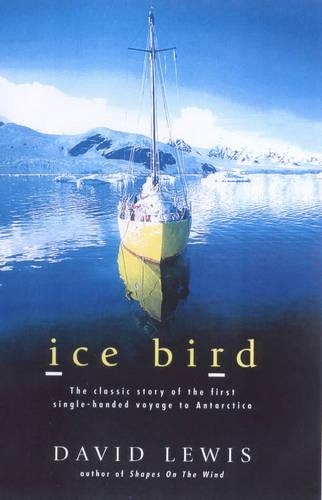
Ice Bird
(Paperback)
Publishing Details
Ice Bird
By (Author) David Lewis
HarperCollins Publishers (New Zealand)
HarperCollins Publishers (New Zealand)
2nd May 2001
New Zealand
Classifications
General
Non Fiction
910.9167
Physical Properties
Paperback
250
Width 155mm, Height 235mm, Spine 17mm
408g
Description
David Lewis has achieved many things in his remarkable life - he has been a navigator, anthropologist, scientist, doctor, leper colony worker, academic, author and father. But it is his exploits on the sea that have gained his most fame. Until David Lewis's attempt, no one had ever sailed a yacht single-handed to Antarctica. For Lewis, trying to reach the frozen southern continent, relying entirely on his own resources, was to accept the ultimate challenge of the sea. He set sail from Sydney on 19 October 1972. With the exception of a brief stop at Stewart Island, he would not make land again for fourteen and a half weeks. Mountainous seas, constant gales, snow storms and freezing temperatures plagued the trip. And then, 2500 miles from Antarctica, "IceBird" capsized and was dismasted. What had started as high adventure became a struggle for survival. Further disasters were to follow.
Author Bio
The late Dr David Lewis (DCNZM) was born in Plymouth, England, in 1917. At the age of two, he moved to New Zealand with his family and went to school in Tapu in Auckland Province and Titikaveka in the Cook Islands. Later, he attended Wanganui Collegiate School and Otago University Medical School, but completed his medical degree in Leeds, England, graduating with a MB, ChB in 1942. During the Second World War, he was a Parachute Battalion Medical Officer in the British Army. After the war, he moved to Jamaica to be near his plantation-owning parents, and became a port doctor and a physician in a leper colony. After his father died, he returned to England and set up a general practice in the East End of London. In 1964, however, he quit his practice to sail with his wife and two children around the world in a catamaran, Rehu Moana, the first multihull circumnavigation. Sailing was not a new pursuit for Lewis. As a teenager, he had canoed 430 miles from his school at Wanganui to his home in Auckland. In 1960, he had placed third in the first single-handed transatlantic race, won by Francis Chichester, and had raced again in 1964. In 1963, he had led the Greenland Sea Expedition. But it was after the three-year-long Rehu Moana adventure that Lewis began a new chapter in his life, cut off from a nine-to-five job and conventional limitations. It was a period of both great adventure and scientific and personal discovery for Lewis, and his activities centred on two mysterious parts of the globe: the Pacific and the Antarctic. In the late 1960s, Lewis spent nine months sailing with the traditional star-path navigators of the Pacific Islands on the gaff ketch Isbjorn. Then, in the mid 1970s, he joined the crew of the double-hulled canoe Hokule'a for a 2500-mile voyage without conventional navigational aids from Hawaii to Tahiti. He also made several expeditions into the deserts of Central Australia, documenting the way finding secrets of the Australian Aborigines. In the early 1970s, Lewis made the first-ever single-handed voyage to Antarctica in the yacht Ice Bird, and followed that up with three other Antarctic expeditions in the late 1970s and early to mid 1980s. The subsequent two decades were largely spent on scientific expeditions in the Soviet Far East, Alaska, Melanesia and Polynesia. In 1993, aged seventy-six, he once again sailed single-handed, this time from the Solomon Islands to Australia. In 2000, aged eighty-three, he attempted to sail his yacht Taniwha to the Caroline Islands in Micronesia in order to return an ancient rokeyok, or sacred navigator's vessel, to its traditional custodians but the yacht foundered and sank off Tryphena Bay, Great Barrier Island. Sadly, Lewis was forced to make the trip by more conventional means - by air. In late 2000, he began fitting out a new yacht, Leander, with the help of friends and benefactors and, with no firm plans in mind, began sailing up the east coast of Australia. On 22 October 2002, Lewis passed away in Gympie Hospital, Queensland. He was eighty-five. His last piece of writing, a new chapter for his autobiography, Shapes on the Wind, will be published in Shapes on the Wind: Updated Edition, to be released in December 2002. David Lewis was the author of twelve books and contributed fiction to Argosy magazine, and articles to National Geographic, Playboy, Oceania, The Lancet, The British Medical Journal, Medical World, Exploration Medicine, the Journal of Pacific History, the Journal of the Polynesian Society, the Journal of the Royal Institute of Navigation and Hemisphere. He was the recipient of the following honours: Honorary Citizen of Newport, Rhode Island (1964); Francis Chichester Trophy from the Royal Yacht Squadron (1965); Bernard Fergusson Trophy for New Zealand 'Yachtsman of the Year' (1965); Daily Telegraph Award as 'Traveller of the Year' (1967); Royal Cruising Club Seamanship Medal (1967 and 1975); Honorary MSc from Leeds University (1967); Fellowship and Gold Medal of the Australian Institute of Navigation and the Royal Institute of Navigation (1975); Superior Achievement Award of the American Institute of Navigation (1975); Honorary Life Member of the Royal Burnham Yacht Club, the Royal Western Yacht Club of England, the Royal Cruising Club, and the Little Ship Club; Blue Water Medal of the Cruising Club of America (1982); attachments to the University of Alaska (1988-91) and the University of Auckland and National Maritime Museum of New Zealand (1990-96); Australian Geographic Society's 'Adventurer of the Year' (1998); Member of the Society to Study Human Performance in Extreme Environments (1999); Distinguished Companion of the New Zealand Order of Merit (2001); and Honorary Fellowship of the Royal Institute of Navigation (2002). He is survived by four adult children, three grandchildren and one great-grandson.
